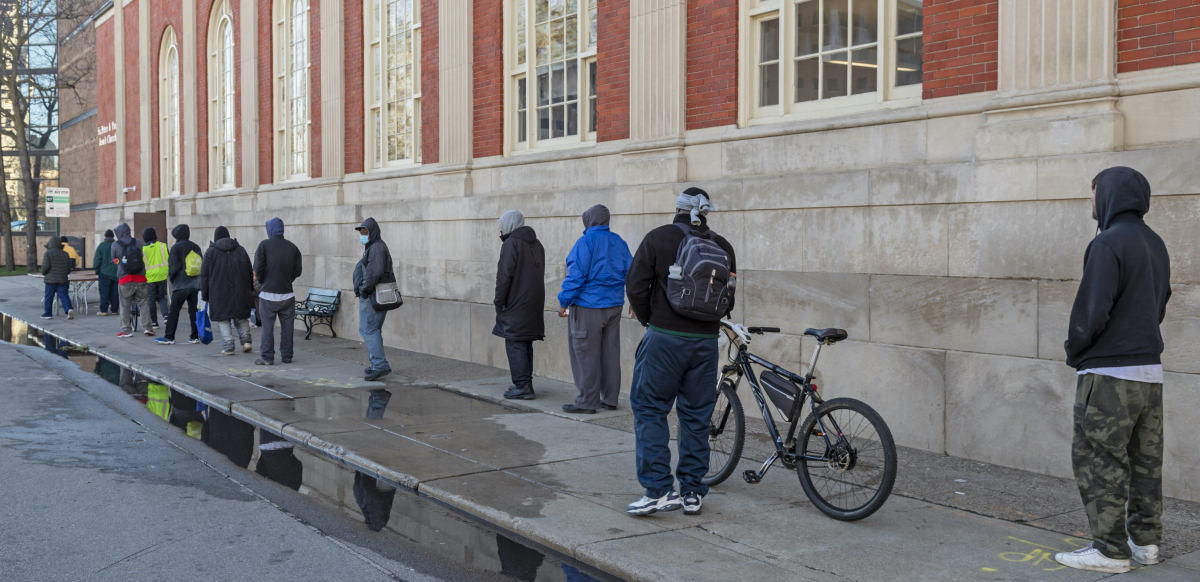Workers Will Take the Brunt of This Recession—Just Like the Last One—Unless We Say No

This Detroit homeless shelter has been forced to move its operations outside. The millions of Americans working two or three part-time jobs with no benefits, sometimes at less than $10 an hour, never saw a recovery from 2008. Photo: Jim West, jimwestphoto.com
One reason today's horrific recession feels so familiar is that we're still digging out of the last one. When the housing market collapsed in 2008, 10 million people lost their homes and 9 million lost their jobs. The poverty rate went up and has stayed up even when unemployment fell to record lows.
According to mainstream economists, the 2020 economy, pre-pandemic, was in great shape. But the millions of Americans working two or three part-time jobs with no benefits, sometimes at less than $10 an hour, never saw a recovery from 2008.
Wall Street got bailed out, of course—even though it had caused the crisis with its predatory lending and with the aid of deregulation. But in the decade to come, all economic ills were blamed on homeowners themselves and on public sector workers, especially on teachers—and don’t forget their unions.
Governor Scott Walker of Wisconsin famously called public sector workers “the haves” and all other taxpayers “the have-nots.” Public budgets were slashed. Employers in every sector continued to squeeze their operations leaner. A Democratic-controlled government led by President Obama didn't halt the trend, and sometimes joined right in. Republicans swept statehouses on anti-tax, anti-spending platforms.
The strategy for many unions was to lay low, offer concessions, hide from media attacks, and hope to wait out the storm. Randi Weingarten, for instance, president of the Teachers (AFT), once joined with Governor Chris Christie to plug a local teachers contract that included merit pay, calling her approach “solution-based unionism.” Christie had cut $250 million from New Jersey schools.
When Wisconsin workers were out in force in the winter of 2011, protesting Walker's union-busting Act 10, the large state unions offered up pensions and benefits concessions on a platter, hoping they'd be allowed to keep dues check-off. Walker ignored them and passed Act 10 anyway. Union membership plummeted.
NOW THEY'RE HEROES
It's different today, in a way. No one is blaming workers for the coronavirus or saying they are lazy or caused their own job loss. Some usually-ignored workers are even called heroes, and offered a pittance of hazard pay.
But the accolades make no difference. The result of the 2020-21 recession will be the same as the one 12 years ago: workers will take the brunt unless we say no. Already the think tanks have drawn up their “austerity wish lists”: for budget cuts, attacks on collective bargaining, concessions, reneging on public sector pensions. The 2020 stimulus has given some relief to individuals, but not enough, and, as in 2008, has been directed mostly to the 1%, with tax cuts for the rich, banks prioritizing million-dollar loans intended for small businesses to big corporations, and money to charter schools.
Should we resign ourselves to the same fate as in 2008?

SUPPORT LABOR NOTES
BECOME A MONTHLY DONOR
Give $10 a month or more and get our "Fight the Boss, Build the Union" T-shirt.
Instead let's learn the right lessons and use this crisis as an opening to fight for a society that takes care of everyone.
Unlike in 2008, when unions trusted in the new Democratic majority, in 2020 we know what we are up against.
DISRUPTION IN A GOOD CAUSE
Since 2008 we've seen that disruption in a good cause—when people are fighting for themselves—is popular with the public, and that big demands resonate more than begging for crumbs.
Remember the occupation of the Republic Windows and Doors factory in Chicago in December 2008, the public employees' occupation of the Wisconsin Capitol in 2011, Occupy Wall Street that fall, the Chicago teachers strike in 2012, the fast-food $15 strikes of 2012-13, the huge crowds of young people who came out to support Bernie Sanders' call to end student debt and enact Medicare for All in 2016 and this year, the wave of red-state teachers strikes in 2018.
These actions built on each other, with lessons for the labor movement. This year, the mandated shutdowns made it crystal clear—and we didn't even have to strike to prove it—when workers can’t work, the economy doesn’t work. Suddenly we see who’s essential, and it’s not bankers.
No wonder mayors and governors were hesitant to close schools. Now the public is told that what they called “failing schools” are essential hubs for communities. They may not want to spend money on education, but they sure like the schools' baby-sitting function—so parents can work.
In 2018 the number of workers in big strikes suddenly skyrocketed to 485,000, the largest since 1986. We can use the momentum of the fights workers have taken on in recent years to make the case for a new New Deal, a green one. The coronavirus isn’t the only catastrophe coming our way; climate change isn’t slowing down. The necessity of Medicare for all, funded transit, public schools, and affordable housing has never been more clear.
This time we know the money is there. What's lacking is the political will—politicians' will, that is—to spend it on the vast majority of people. That has to come from us.
It's not going to be easy, putting on a fight in the middle of a recession. But what's our choice?






